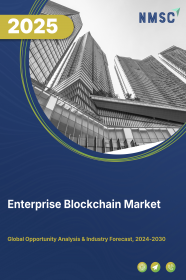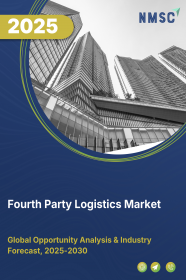
Enterprise Blockchain Market by Component (Platform, and Others), by Type (Public Blockchain, and Others), by Application (Payments and Settlement, and Others), by Organization Size (Large Enterprises, and Small and Medium Enterprises SMEs), by Deployment Model (Cloud, and On Premises), by Deployment Stage (Proof of Concept, Pilot, and Production), by Industry Vertical (Banking Financial Services and Insurance, and Others) - Global Opportunity Analysis and Industry Forecast 2024-2030.
Market Definition:
The Enterprise Blockchain Market size was valued at USD 9.64 billion in 2023 and is predicted to reach USD 145.9 billion by 2030 with a CAGR of 47.4% from 2024-2030.
Blockchain technology refers to an advanced, well-established distributed ledger that is utilized to record transactions and information from different frameworks where data is un-modifiable. It is a method of storing data that prevents anyone from altering, hacking, or duplicating it.
The main essence of enterprise blockchain is a trusted record of data, which is held by assembling organizations and chosen third parties to assess it with no central user control. Blockchain plays a fundamental part in the enterprise as it works on the asset management and payment cycle consequently and eliminates the intermediaries. This technology has shown the prolonged use of cryptocurrencies such as Bitcoin, Ethereum, and others that keeps transparency while exchanging information. In addition, an enterprise blockchain is a permissioned blockchain where companies have direct command over it. Enterprise blockchain also has the facility to block transactions that do not fulfill its protocols.
Market Dynamics and Trends
Increasing demand for enterprise blockchain due to the growing trend of cryptocurrencies owing to its transparency and visibility attracts the interest of the investors coupled with safer technology in terms of data threats as blockchain is a peer-to-peer network database ruled by a decentralized system concerned across the globe. Also, the rising penetration of cloud services coupled with digital money and asset management due to the affordability, security, and reliability of blockchain when compared to centralized cloud storage has been driving the growth of the market.
Moreover, rising awareness of data protection from malware among enterprises is expected to further propel the growth of the enterprise blockchain market. For instance, blockchain transactions are recorded on a ledger, where tools of blockchain such as Chain analysis, TRM Labs, and Anchain.AI help to mitigate attacks and make it easy to trace ransomware.
However, an increase in the regulatory framework by governments and a lack of blockchain expertise are the factors that restrain the growth of the market. On the contrary, the incorporation of blockchain with artificial intelligence (AI) such as AI-enabled smart banking solutions for financial institutions and banks is expected to create ample growth opportunities for the market in the coming years.
Market Segmentations and Scope of the Study
The enterprise blockchain market is segmented on the basis of component, type, organization size, deployment, application, industry vertical, and geography. On the basis of components, the market is divided into solution and blockchain as a service. On the basis of type, the market is classified into public, private, and other. On the basis of organization size, the market is segmented into small and medium-sized businesses and large enterprises. On the basis of deployment, the market is bifurcated into proof of concept, pilot, and production. On the basis of application, the market is categorized into trade finance, international currency transfer, syndicated loans, post-trade: clearing & settlement, automated compliance, machine-to-machine (M2M) IoT asset management, payments, crowdfunding venture capital (VC), supply chain management, and patient records management. On the basis of industry vertical, the market is divided into manufacturing, media & advertising, BFSI, IT & telecom, retail, healthcare, automotive & transportation, and others. The geography breakdown and analysis of each of the aforesaid segments include regions such as North America, Europe, Asia-Pacific, and RoW.
Geographical Analysis
North America region is expected to hold the lion’s share of the enterprise blockchain market size and is expected to continue dominating the market during the forecast period. This is attributed to the high adoption rate of blockchain technology in industries that include BFSI, government, and healthcare.
For instance, the Society for worldwide interbank financial telecommunications (SWIFT) allow banks to settle transactions directly and keep track of the customer’s financial transaction. Also, the introduction of blockchain technology in payment and arrangements in region-specific companies such as Circle, Zcash, and Ripple strengthens the security and stability driving the market growth in this region.
On the other hand, Asia-Pacific is expected to show a steady rise in the enterprise blockchain market due to the broad use of blockchain solutions in banking and cybersecurity.
For instance, in January 2022, Asian Development Bank (ADB) launched a project to make cross-border securities transactions in the region efficiently and securely through blockchain technology. Connecting institutions within a blockchain network can reduce both transaction costs and settlement risks.
Also, increasing demand for real-time data analysis, enhanced visibility, and proactive maintenance in the organization structure paired with the high potential of blockchain technology in the start-ups in the region such as Signzy, Coi,nDCX, and InstaDapp are expected to drive the market growth.
Competitive Landscape
The enterprise blockchain market comprising of various market players such as International Business Machines Corporation (IBM), Oracle Corporation, Amazon Web Services, Inc. (AWS), Microsoft Corporation, SAP SE, ConsenSys Inc., R3 LLC, Accenture Plc, Digital Asset Holdings, LLC, Ripple Labs Inc., Huawei Technologies Co., Ltd., Alibaba Cloud (Alibaba Group Holding Limited), Hedera Hashgraph, LLC, Kaleido, Fujitsu Limited These market players are adopting various joint venture strategies and planning expansion of business across various regions to maintain their dominance in the market.
For instance, in August 2025,Oracle Corporation Oracle Blockchain Platform Digital Assets Edition v25.2.2 introduced confidential mode support, new APIs for CBDC applications, and enhanced enterprise integration capabilities.
Moreover, in February 2025, Microsoft CorporationMicrosoft released version 5.0.12 of its Confidential Consortium Framework, designed for scalable, permissioned distributed ledgers.
Key Benefits
-
The enterprise blockchain market report provides a quantitative analysis of the current market and estimations from 2022 to 2030. This analysis assists in identifying the prevailing market opportunities to capitalize on.
-
The study comprises of an extensive analysis of the enterprise blockchain market trends including the current and future trends for depicting the prevalent investment pockets in the market.
-
The information related to key drivers, restraints, and opportunities, and their impact on the enterprise blockchain market is provided in the report.
-
The competitive analysis of the market players along with their market share in the enterprise blockchain market is mentioned.
-
The SWOT analysis and Porter’s Five Forces model are elaborated on in the study.
-
The value chain analysis in the market study provides a clear picture of the stakeholders’ roles.
Key Market Segments
By Component
-
Platform
-
Infrastructure and Middleware
-
Blockchain as a Service (BaaS)
-
Services
-
Professional Services
-
Managed Services
-
-
Hardware
By Type
-
Public Blockchain
-
Private Blockchain
-
Consortium Blockchain
-
Hybrid Blockchain
By Application
-
Payments and Settlement
-
Smart Contracts and Automation
-
Supply Chain and Provenance
-
Digital Identity and Access
-
Asset Tokenization and Management
-
Trade Finance
-
Data Sharing and Notarization
-
Compliance and Regulatory Reporting
-
Other Applications
By Organization Size
-
Large Enterprises
-
Small and Medium Enterprises SMEs
By Deployment Model
-
Cloud
-
Public Cloud
-
Private Cloud
-
Hybrid Cloud
-
-
On Premises
By Deployment Stage
-
Proof of Concept
-
Pilot
-
Production
By Industry Vertical
-
Banking Financial Services and Insurance (BFSI)
-
Healthcare and Life Sciences
-
Government and Public Sector
-
Retail and E commerce
-
Manufacturing
-
Supply Chain and Logistics
-
Energy and Utilities
-
Telecommunications
-
Media and Entertainment
-
Other Industries
By Geography
-
North America
-
The U.S.
-
Canada
-
Mexico
-
-
Europe
-
The U.K.
-
Germany
-
France
-
Italy
-
Spain
-
Rest of Europe
-
-
Asia-Pacific
-
China
-
India
-
Japan
-
South Korea
-
Australia
-
Rest of Asia-Pacific
-
-
RoW
-
UAE
-
Saudi Arabia
-
South Africa
-
Brazil
-
Remaining countries
-
Key Players
-
International Business Machines Corporation (IBM)
-
Oracle Corporation
-
Amazon Web Services, Inc. (AWS)
-
Microsoft Corporation
-
SAP SE
-
ConsenSys Inc.
-
R3 LLC
-
Accenture Plc
-
Digital Asset Holdings, LLC
-
Ripple Labs Inc.
-
Huawei Technologies Co., Ltd.
-
Alibaba Cloud (Alibaba Group Holding Limited)
-
Hedera Hashgraph, LLC
-
Kaleido
-
Fujitsu Limited

















 Speak to Our Analyst
Speak to Our Analyst
























